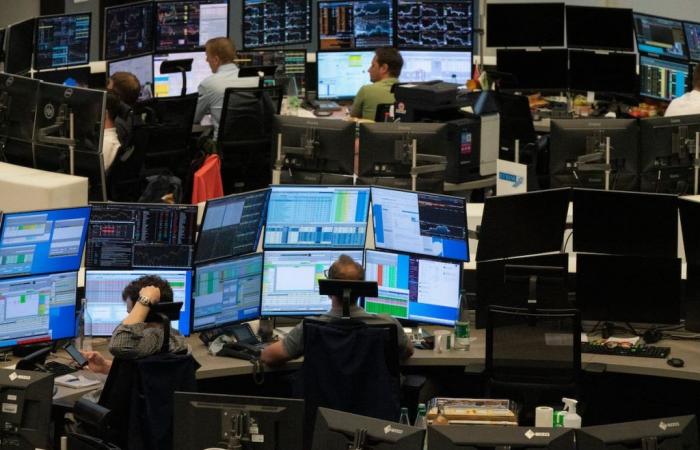Although the skyrocketing valuations of American technology companies, led by Nvidia, have attracted the interest of investors in the last year, big managers are beginning to turn towards the Old Continent. DWS, the manager of Deutsche Bank, is betting on the European stock markets in this second half of the year, despite the uncertainty and the political earthquake in France. “We feel more comfortable in European stocks,” said Mariano Arenillas, the manager’s director for Iberia, in his outlook presentation this Wednesday in Madrid. Stock market performance will be driven by the path of rate cuts: within a year, DWS expects three drops in the price of money in both the eurozone and the United States.
For the second half of the year, the manager is “constructive in equities”, but with “certain fears”, mainly derived from valuations in the United States. The earnings per share ratio – a fundamental metric to identify whether a security is overvalued – on Wall Street is excessively high, for the German manager, which leads them to bet on Europe. “Without denying the strength and disruption that artificial intelligence has generated, we think that it will be very difficult for these companies to be able to maintain growth rates in results in the long term,” Arenillas pointed out.
DWS will bet on a diversified portfolio in the face of “possible scares”: these shocks, the head of the manager for Spain and Portugal has pointed out, will come above all from the geopolitical side, such as the two war conflicts opened in Ukraine and Gaza, or the US elections at the end of the year. In addition, Arenillas has highlighted the possibility of a surprise rebound in inflation, due to the rise in oil, and the threat to world trade from the protectionist policies taken by the US or the EU. These, she has advanced, are benefiting neighboring countries like Mexico.
A good example of these “scares” has been the call for legislative elections in France, which has triggered the concern of some markets already fearful of the possibility of a cohabiting Executive. Arenillas, however, takes the weight off: “The effect of the elections is not an issue of one party or another, it is simply that when the market does not expect data or something and that event arises, uncertainty is generated. A volatility that remains until that event, in this case the elections.” Despite concerns about public finances and the change in the rating of French debt, DWS affirms that “they do not expect a crisis” in the French country.
For this year, the German manager is revising its global growth expectations upwards, to 3.1%, thanks, above all, to a stronger than anticipated US economy. The recession is “totally outside of expectations in the US”, where fairly expansive fiscal policies are still being carried out. Regarding currencies, analysts expect the eurodollar to remain at current levels, at 1.08, but that there will be short-term rallies in the greenback. Thanks to its status as a safe haven and, above all, the fact that the ECB has started lowering rates earlier, making the community currency less attractive.
Rate cuts and fixed income
Rates will be the catalyst for market performance in the coming months, whether in fixed or variable income. DWS expects that, within a year, both the ECB and the Fed will make three cuts of 25 basis points each. For the US central bank, the Deutsche Bank manager expects a first cut in September.
Of course, even if there is a moderation, they rule out central banks entering expansionary territory in the short term: “There is a tendency to normalize interest rates. We cannot talk about expansive policies, but rather less restrictive ones. We are in an environment of financing restriction and clearly the objective is for the interest rate minus inflation to remain positive,” Arenillas stressed.
The beginning of a downward path in rates could reactivate interest in fixed income, where DWS sees an opportunity. The swings in inflation and expectations have made it, strangely, more volatile than the stock market in recent months, and sustained drops in the price of money can encourage it: when rates fall, the bonds that are already circulating in the market market become more attractive, because they give higher returns.
“In a moderate risk portfolio we are overweighting fixed income,” acknowledged Arenillas, who highlighted that his forecasts provide high profitability at relatively low risk. In addition, the head of the Deutsche Bank manager for Iberia has added the strong demand they are seeing for short-term fixed income from investors. “Investor behavior is calm. If the profitability expectations are the same and I do not take risks, I prefer to be in a money market that will pay me 4%,” he concluded.
Follow all the information Five days in Facebook, x and Linkedinor in our newsletter Five Day Agenda
Newsletters
Sign up to receive exclusive economic information and the financial news most relevant to you
Sign up!


